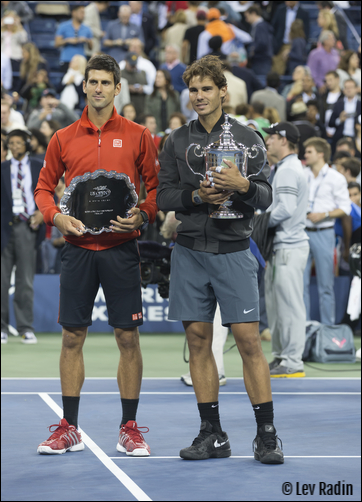Comparison of Adjectives (Tennis) Lesson
In this comparison of adjectives lesson, we're going to compare the tennis sensations Rafael "Rafa" Nadal and Novak "Nole" Djokovic.
Even if you're not a tennis fan, you can still learn some very important grammar in this lesson.
In the photo above, you'll see that both players were finalists at the 2013 US Open. You can probably guess who won by which player is holding the larger trophy. In case you don't know, Rafa is wearing the blue and black outfit with the Nike logos.
Comparison of adjectives: overview
First of all, what exactly are comparative adjectives?
They are adjectives that compare (=contrast) two different nouns (persons/places/things). The comparison of adjectives tell us how two different things are alike or different.
For example, as you can see in the photo:
- Novak is a little bit taller than Rafael.
- Rafael's trophy is bigger than Novak's trophy.
Comparison of adjectives: form
The form of comparative adjectives depends on the base adjective.
– For 1-syllable adjectives, add –er:
|
old –older |
slow – slower |
– Spelling note: for 1-syllable adjectives ending in one consonant, double the consonant:
|
fat – fatter |
thin – thinner |
– For adjectives that end in e, add –r:
|
late – later |
nice – nicer |
– Adjectives that end in y, change the y to –ier:
|
sunny – sunnier |
heavy – heavier |
– Longer words (with 2 or more syllables) use the word more instead of adding an ending to the adjective:
|
interesting – more interesting |
crowded – more crowded |
– Of course, there are a few exceptions:
|
good – better |
bad – worse |
– Use the comparative adjective + than to compare two things or people. But only add "than" when you actually state both things or people:
Rafael is older than Novak.
Novak is younger.
– Use as ..... as with an adjective when two things or people are the same (or not the same). But, do not change the base form of the adjective when using as...as:
Novak is as popular in tennis as Rafael.
Novak is not as happy with his trophy as Rafael is.
Comparison of Adjectives Quiz
Ready to practice with a little quiz?
(1) Create comparative forms of these adjectives:
|
Example: hot: |
hotter |
|
small: happy: good: big: hot: heavy: early: nice: young: |
__________________________ __________________________ __________________________ __________________________ __________________________ __________________________ __________________________ __________________________ __________________________ |
(2) Choose the correct adjectives to fill in the blanks below. There are 7 choices but you only need to use 3 adjectives for the answers. Be sure to use the correct comparison form:
old heavy happy young tall early fast nice
At 26 years old, Nole is one year ___________________ than Rafa, who is 27.
Rafa is 185 cm / 85 kg and Nole is 188 cm / 80 kg:
Regarding height, Rafa is almost as ________________ as Nole. With respect to weight, Rafa is slightly ___________________ than Nole.
(3) Fill in the gaps with the correct comparative adjective below. (Be sure to change to adjective to the correct form).
nice happy big small early hot good
a. Both Rafa and Nole are popular and known for being friendly. It’s hard to say who is ___________________.
b. Rafa is currently ranked #1 but Nole was the ___________________ player at the Barclays ATP World Tour finals in London because he won in two sets (6-3, 6-4) that day.
c. Any player should be proud to reach the finals, but the loser is probably is not quite as ___________________ as the winner.
d. The total prize money at the 2013 US Open was $34.3 million, almost a 40% increase above the 2012 prize money. The prize money in 2013 was much ___________________ than in 2012.
e. Since the women play the best of 3 sets at Grand Slam tournaments and the men play the best of 5, some say the women’s prize money should be ___________________.
f. The women’s end-year championships were held in September 2014 in Istanbul and the men’s in London in November 2014. The women’s match was held at an ___________________ date.
g. The temperature at the US Open finals in New York was much ___________________ than the exhibition match Rafa and Nole played in the glacier (ice) park in Patagonia.
Comparison of adjectives quiz answers
(1) smaller, happier, better, bigger, hotter, heavier, earlier, nicer, younger
(2) older, tall, heavier
(3) a. nicer, b. better (not "gooder"), c. happy, d. bigger, e. smaller, f. earlier, g. hotter
Your turn
How did you do on the quiz? Who do you like better? Do you play tennis better than your friends? What things do you do better than other people you know. Write your answers on a sheet of paper.
By the way, if you'd like to learn about superlative forms of adjectives, click here for another tennis lesson, this time with the best female players in 2013.
- Home Page ›
- Main Grammar Page ›
- Comparison of adjectives

